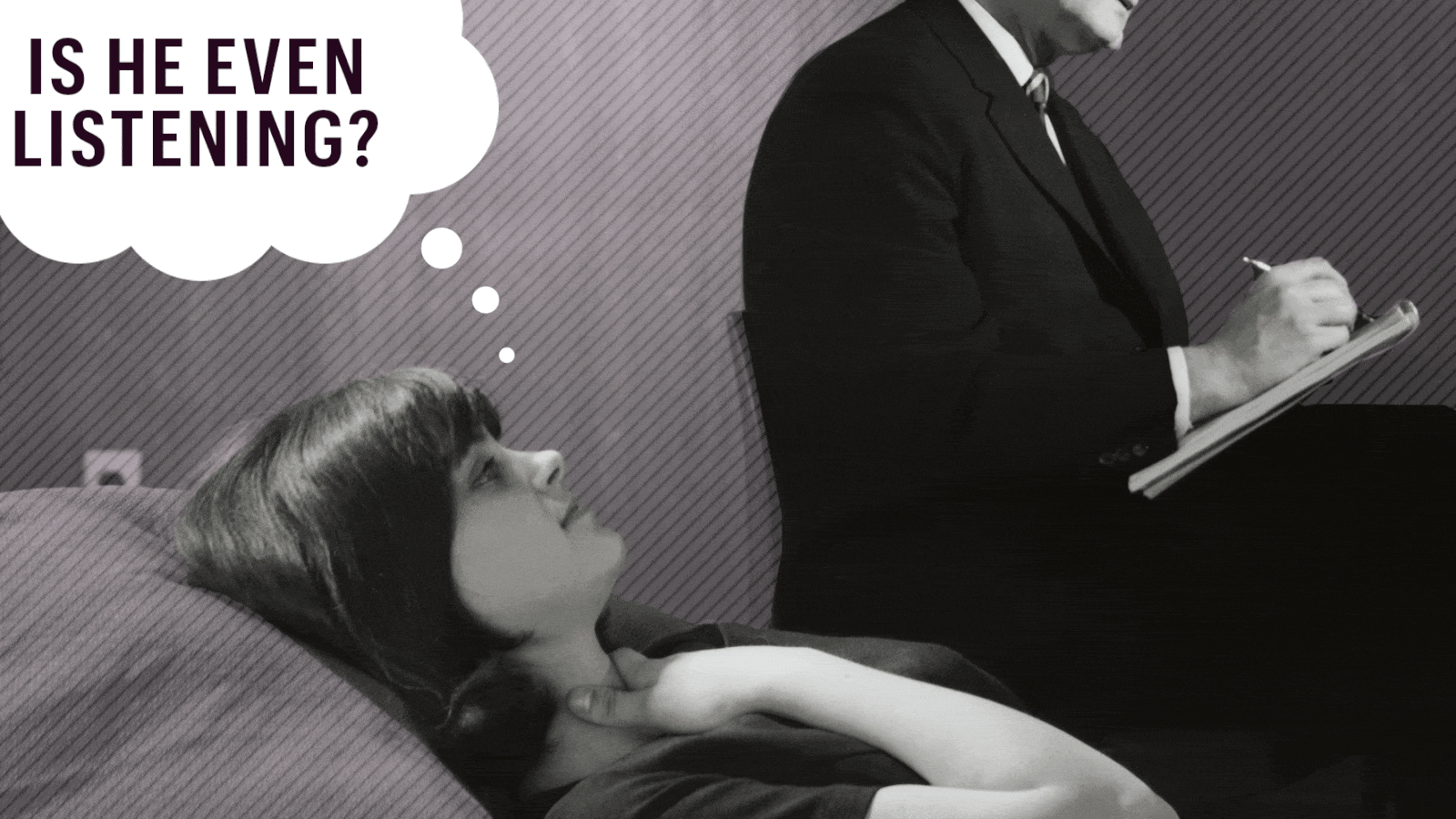Should You Dump Your Therapist?
How to know when it's time to break up with your shrink.

When you think about talk therapy as a health service, it's strange that there isn't, traditionally, a natural conclusion. You break a bone and visit a doctor until it heals. You stop seeing a dermatologist when your acne clears. If the antibiotics work, one appointment with a gastroenterologist for your stomach problems is sufficient. Yet, many people (myself included) end up in therapy for years.
I recently spoke to two friends, Jenna* who broke up with a therapist, and Ellie* who felt her therapist had broken up with her. After eight years seeing her therapist on and off, Jenna felt betrayed when her therapist became critical of her professional work. In addition, she told me, "At some point you're like, oh my god, am I just talking about the same thing every week, or am I going in circles?" During a phone session, Ellie's therapist made her feel as though her own personal problems weren't worth discussing, given contemporary global issues. Ellie hasn't spoken to her since. I simply stopped seeing a therapist because I could no longer pay, although I didn't let her know until the last session I could afford.
"Why does therapy sometimes extend over a period of years, with no end in sight?"
While our situations were all specific, they each involved discomfort about what the ideal therapist relationship looks like and its appropriate length, as well as a lack of consensus about what therapy (and its end) should *feel* like. When, exactly, can you quit therapy, and what's the best way to do that? Why *does* therapy sometimes extend over a period of years, with no end in sight? How can anyone entering therapy be most assured that they're getting as much out of it as possible? We went straight to the experts to get some answers. Turns out, ending therapy is a bit like a break up, as there's apparently no one size fits all—but there are *better* ways to do it.

Step 1: Inform Yourself
No matter how many weeks/months/years you've been in therapy, inform yourself about your therapist's approach. It's important to distinguish between today's primary methodologies, which lead to divergent therapeutic processes. Psychoanalysis examines the underlying causes of the patterns in a person's life. This open-ended approach can take a significant amount of time, as patients explore their personal histories (sometimes multiple times per week). Cognitive behavioral therapy, or CBT, can alternatively last only 6-12 sessions, according to Whitney Dicterow, Psy.D., a staff psychologist at UCLA Counseling and Psychological Services.
"The idea in CBT is that we don't want to keep people in therapy forever. We want them to be able learn skills in therapy and ultimately become their own therapist so they can really apply what they're doing in therapy into their own lives," she says. Of course, some therapists blend these approaches and others. Dialectical behavioral therapy, which grew out of CBT, treats more serious personality disorders such as borderline personality disorder. Acceptance and commitment therapy teaches patients to accept, instead of reject, reality. Supportive therapy aims to make a person feel understood and supported.
Step 2: Before Moving On, Ask Yourself These Questions
It's important to take time and ask yourself why you want to stop therapy. The therapists I spoke to expressed that, sometimes, the reason a patient wants to discontinue lies in his or her resistance to facing difficult issues. Consider the following questions: Is the therapist simply a bad personality match? Is there something he/she might be able to improve upon? Are you ready for the challenge of leaving and tackling problems on your own? Is there shame about staying in therapy, which the therapist can help address? If the issue is simply financial, therapists are sometimes willing to negotiate fees.
Christine Anzieu-Premmereur, M.D., PhD., at Columbia University, views a patient's anger with her and the desire to end therapy sometimes as an example of transference, as in the patient may be transferring his or her negative thoughts onto her. "For some people, I am immediately an idealized parentage figure. I'm supposed to know everything, to understand everything, even to read their mind without them talking to me, which puts them in a very insecure position."
Stay In The Know
Get exclusive access to fashion and beauty trends, hot-off-the-press celebrity news, and more.
Taylor Chesney, Psy.D., a therapist with her own CBT practice in New York, speaks about patients who find they don't actually want to get better. "If someone comes to me with testing anxiety, that anxiety does a lot of great things for them," she says. The patient is likely to go to office hours to get extra help, less likely to go out partying the night before. "That worry and anxiety about how they're performing causes them to do some adaptive behaviors. You wouldn't necessarily want to give up all that." Other patients with phobias aren't ready to face their fears through exposure therapy, which puts them into contact with the thoughts and conditions that provoke their anxiety. If the patient isn't ready to make a change, therapy won't help.
Adele Tutter, M.D., Ph.D., who practices psychoanalysis and supportive therapy at Columbia, explains how to determine, on a day-to-day basis, whether a patient should continue: "Are they still getting something out of it? Are they still learning and improving? Are they still able to use what they're learning in therapy?" There's a danger that the patient might become too dependent on the therapist—"the Woody Allen phenomenon, so to speak." Sometimes a therapist will want to end the relationship, as everything seems fine, and the patient will resist. This often happens, says Tutter, if the patient is holding something back, not revealing all of his or her problems. The opposite can also occur, "either because the therapist really does believe that there is something that isn't being sufficiently addressed, or because the therapist wants the patient to stay, frankly because of income. It happens all the time." Certainly, be wary of this situation as well.
Step 3: End It—Here's How
So what to do if, well, it's just not working out? Dicterow gives an example of how you might express your decision to terminate the relationship. You might say, "I've appreciated the time and energy you've put into talking to me the last couple of weeks. In thinking about it, I think I might be a better fit with a different kind of therapist. So I'm going to be ending our therapy and starting with a new therapist." Being honest is key. If there's something the therapist is doing in particular, though, she urges the client to express that. Feedback is especially helpful for CBT therapists, as they view the therapeutic relationship is collaborative in nature.
"Ideally, this is something we discuss together. We plan. We have an agreement on when and how we will terminate."
"Termination is a process," says Anzieu-Premmereur. "Ideally, this is something we discuss together. We plan. We have an agreement on when and how we will terminate. Sometimes it's better to allow somebody to leave and to come back. It's important to have a good experience and to trust in the psychotherapist and the feeling that you were understood, even when you didn't know what the therapist wanted." Termination is also for the therapist, allowing him/her a sense of closure as well. While it might sound obvious, patients should remember that their therapists are people too—they've invested in the relationship and it's ideal for them to come to a fulfilling resolution as well.

"Bring it up and don't avoid the topic," says Tutter. Have a frank discussion with your therapist. "The biggest challenge is whether the therapist will be able to deal with that in a non-defensive way and address it as a valid topic," she says. Tutter will set a stop date with the patient the moment that issue is on the table—she likes to give it a couple of months. Often, she says, the most important issues come up when you know there's a limited amount of time. Actually setting an end date, then, might force you into the most insightful sessions.
Over time, hopefully, you'll better understand what type of treatment works best for you and how you can advocate for it. Chesney urges patients to consider what they really want out of therapy. If you're already in the middle of therapy you can always, of course, reassess. "It's just a matter of what your goal is," she says. "Is your goal to be able to understand yourself better and your history, or is your goal to make changes in your life—to learn how to change the way that you're thinking and the way that you're feeling so that you can keep those gains for later in your life?" If the answer is to make changes, she believes that you should choose a therapist who practices CBT and has a more time-limited approach to therapy. Alternately, Tutter says, "I think that if we understand what our motivations and our conflicts are, it really allows us to live a better life and to have a much better understanding of the challenges we have, interpersonally, and in all realms."
Here's to a better match next time.
Follow Marie Claire on Facebook for the latest celeb news, beauty tips, fascinating reads, livestream video, and more.